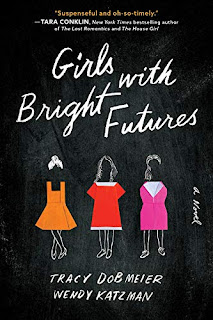Friday, August 6, 2021
Perfect Tunes
How the Word is Passed
I want you to know what the tour guide means when she tells people on her tour of slavery sites in New York City "Don't believe anything if it makes you too comfortable."
The Mercies
Sunday, July 11, 2021
Where the Grass is Green and the Girls are Pretty
Did I check out this book because of the title and my 90s girl dedication to Guns n Roses?
Yes.
Was I punished for my superficiality?
Also yes.
I'll keep it brief.
The book is yet ANOTHER novel that nods back the Aunt Becky/Varsity Blues/college admissions scandal. In this book, a prominent network news anchor gets caught up in the story she's supposed to be covering when her own husband gets arrested in an FBI sting, and accused of paying someone to get her daughter into college.
The story isn't exactly what it seems on the surface, but the plot reveals itself so quickly, you find yourself wondering "What are we going to do with the other 350+ pages? Hum the guitar solo for November Rain? Learn to really whistle that opening on Patience? Seeing if I can get my hair like Slash?" All of those would have been better options that reading this book all the way through, which I did.
There was one final plot twist at the end, but by then, I was so ready for it to be over, I literally rolled my eyes and closed the cover.
And do you want to know the worst part? That title was never even relevant in the story at all.
I'm back to judging books by their cover, not their title.
And because I need you to leave this page with something positive, I give you MY favorite GNR song.
Better Not Bitter
Girls With Bright Futures
You know that whole college scandal with the fake rowing scholarships and Aunt Becky and all of that? If recent fiction is any indication, half the authors in America heard that story and said to themselves "THAT would be a good book!"
In my experience, though, none of them have even come close to the juicy reality.
Now is the time in the review where I make a confession. I barely remember the plot of this book. In my defense, I read it about a month ago and haven't had time to write a review. But, also, I just accidentally read ANOTHER book with this plot and both were equally unmemorable. They're books about overzealous moms, anxiety-ridden teenage girls (because of said moms) and the increasingly insane world of college admissions.
Do I recommend you read this? Literally, I don't know. I should have paid someone to write this review for me instead.






